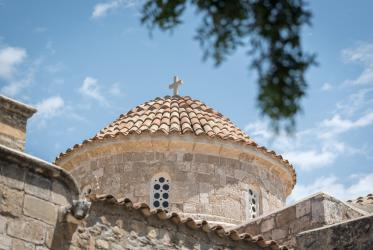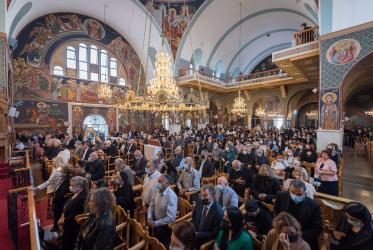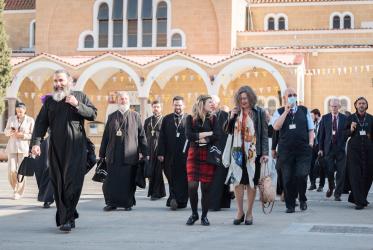Damascus, Syria, March, 2000
Organization of the WCC
Introduction
Sub-Committee I of the Special Commission on Orthodox Participation in the WCC met on March 6-8, 2000 at St Ephrem Theological Seminary, Ma'arat Saydnaya, Syria, as guests of His Holiness Ignatius I Zakka, Syrian Orthodox Patriarch of Antioch and all the East. Our task, as detailed below, was to make recommendations on some immediate and medium-term measures which might address some of the concerns raised by Orthodox member churches regarding their participation in the WCC. We began our work by hearing and discussing papers from D'Arcy Wood and Eden Grace on consensus decision-making as practiced by their churches. We then heard and discussed a paper from Fr. Leonid Kishkovsky addressing some of the main questions raised by Orthodox reflections and proposals, and a paper from Jean Fischer offering a response to the two papers from the Orthodox meeting in Chambésy in December 1999. We appreciated the opportunity to be meeting concurrently with Sub-Committee IV, and were helped in our work by a joint panel discussion between the two Sub-Committees which explored the experience of a number of regional and national councils of churches (National Council of Churches of Christ in the USA, Middle East Council of Churches, Canadian Council of Churches, Churches Together in Britain and Ireland, the Conference of European Churches, and the National Council of Churches in Australia).
|
Working agenda Suggested At Morges |
a. Should membership be based on individual member churches or another model |
b. How should the Orthodox churches be fairly represented in governing bodies? |
c. What method shall we use for decision making? |
Take full account of other issues from Chambésy. |
|
Chambésy (Metr. Chrysostomos' paper) Part I |
b. merging of churches c. criteria for membership |
a. participation on equal footing e. parity in executive committee or new ad hoc committee |
d. voting procedures f. recording of minority opinions |
g. reception of ecumenical agreements |
|
"Questions" portion of Chambésy Report [Cf. pp. 3-4 above (Ed.)] |
4. confessional or family structures in the WCC 6. inclusion of Roman Catholic, Evangelical and Pentecostal churches |
1, 2 & 3. Inclusive governance structures 4. confessional or family structures in the WCC 5. equal representation in governance |
5. consensus decision-making |
7. limits of diversity 8. accountability of programs to the member churches |
Recommendations
- Decision-Making
We recommend the principle that WCC decision-making bodies use a consensus method, modeled on that used by the Uniting Church in Australia, to make most, if not all, decisions. The Uniting Church in Australia method will necessarily need to be adapted to the circumstances of a global body. We note that the UCA provides for the use of formal procedures when consensus fails. Careful attention should be paid to formulating the rules of voting, introducing such things as, for example, qualified majorities and quorum considerations. We further note that there may be limited circumstances where legal matters require a vote, but we hope to use the consensus method wherever possible. In any circumstance, consensus or voting, there should be provision for formal recording of minority opinions. We also affirm the current provision in the WCC Rules that, during a business session, a member of the Assembly or the Central Committee may call to stop a process of voting when he or she considers a matter to violate the ecclesiological self-understanding of his or her church.
We believe that the move to a consensus decision-making model is a critically important component of addressing the present situation regarding Orthodox participation in the WCC.
-
Membership
Membership in the World Council of Churches should be held by member churches with responsibilities as listed in the current Rules. Although member churches will retain their identity and independence, they will be regarded as belonging to "family/affinity/groups" that will bring common concerns to the Council and work together to achieve joint representation in the WCC governing bodies. (These issues may need to be reviewed after decisions and principles of representation are clarified by the Special Commission.) We note, in particular, current provisions in the Constitution and Rules in the WCC for using the term "church" to include the possibility of association, convention or federation of autonomous churches. We held initial discussions on the items in Metr. Chrysostomos' paper from Chambésy sections I b & c (criteria for membership and merging of churches), and do not make any recommendations on these items at this time. We anticipate further discussion on these matters. - Representation
We affirm the need to change the system of representation in the governing bodies of the WCC (the Assembly, the Central Committee and the Executive Committee) to insure fair representation for the Orthodox churches as well as for other member churches, recognizing that the present situation is inadequate for many member churches.
We have begun to explore models of representation through "groupings" of the member churches. We noted multiple identities by which churches sometimes feel affinity, such as confessional, regional, churches in communion, Christian traditions of the East and West, etc. Size is also a factor affecting these considerations. The purpose of the "groupings" would be to provide for more adequate voice and a greater sense of belonging to the WCC. Further study needs to be undertaken to develop a configuration that would be relevant to the complex reality of the WCC. Existing models in regional contexts vary from one region to another and can not be directly reproduced at the world level.
In preparing a new WCC model, we should analyze present WCC procedures in organizing the representation of member churches to the Assembly and the representation of the Assembly in the Central Committee. We request that staff prepare materials which would inform us of current practice in allocating seats in the Assembly and Central Committee.
- Other concerns
We urge that considerable efforts be made to increase the number of Orthodox staff in the WCC. We recognize the need for further discussion on making programs and publications of the WCC more disciplined and fully accountable to the governing bodies of the WCC.
We recognize the need, as suggested in the paper of H.E. Metropolitan Chrysostomos from Chambésy, for a mechanism whereby Orthodox churches would have greater opportunity to help set and monitor the agenda of the Executive and Central Committees. We discussed several models, all of which need further consultation and consideration.
Unfinished business
We discussed two matters on which we reached no conclusion: the issue of "equal footing" for Orthodox in the life of the WCC, and the nature of the "groupings" referred to above. We welcome the opportunity for further discussion on these matters in the Special Commission, especially in conjunction with the work on-going in other Subcommittees, prior to the formulation of proposals.
We request that the Steering Committee provide opportunity for the subcommittees to meet during the forthcoming plenary meeting in Cairo.
Note-taker's appendix of open questions
We have yet to articulate the specific revisions to the Constitution and Rules which would be necessary to implement our recommendations. Some of the questions which will most likely need to be addressed in moving toward such revisions are:
- Decision-making
What adaptations of the Uniting Church in Australia's method will be necessary?
Can we continue to learn about consensus decision-making from the experience of member churches, e.g. the Orthodox tradition of conciliarity/sobornost?
What revisions to the voting rules of procedure will be necessary (e.g. qualified majorities, quorum considerations, etc.)?
Are there circumstances where legal matters require a vote?
Noting that consensus is not always unanimity, what will be the role of dissent in the new decision-making method?
How shall we provide for formal recording of minority opinions (recognizing that the current Rule XVI.5(s) is not felt to be sufficient by some member churches)?
Should we allow member churches to publicly "opt out" of particular programs or statements?
How do we educate ourselves in this new method of decision-making? - Membership
Is the current definition of "church" in the Constitution adequate and appropriate?
How can the relationships between REOs and the WCC be strengthened, especially in light of the CUV document?
What role might the "groupings" take in the application process of a new member?
Does the work of the other Subcommittees and the Plenary Commission indicate the need for a further review of the issues of membership?
Continue the discussion on criteria for membership.
Continue the discussion on merging of churches. - Representation
What is the significance of the "multiple identities" identified in the document above?
What configuration of "groupings" would be most suitable to the WCC?
What is the meaning of "equal footing"?
How would representation be apportioned among the "groups"?
How would representation be apportioned within the "groups"?
What can we learn from the current practice of organizing representation in the Central Committee and the Assembly? - Accountability
What is the nature of program accountability to the governing bodies?
What is the nature of program accountability to the member churches?
What is the nature of staff accountability to the governing bodies?
What other relationships of accountability are (or should be) factors for staff, e.g. staff accountability to their own church, to their church "grouping", to their staff colleagues, to particular constituencies, and to specific fields of expertise?
We recommend the principle that WCC decision-making bodies use a consensus method, modeled on that used by the Uniting Church in Australia, to make most, if not all, decisions. The Uniting Church in Australia method will necessarily need to be adapted to the circumstances of a global body. We note that the UCA provides for the use of formal procedures when consensus fails. Careful attention should be paid to formulating the rules of voting, introducing such things as, for example, qualified majorities and quorum considerations. We further note that there may be limited circumstances where legal matters require a vote, but we hope to use the consensus method wherever possible. In any circumstance, consensus or voting, there should be provision for formal recording of minority opinions. We also affirm the current provision in the WCC Rules that, during a business session, a member of the Assembly or the Central Committee may call to stop a process of voting when he or she considers a matter to violate the ecclesiological self-understanding of his or her church.
We believe that the move to a consensus decision-making model is a critically important component of addressing the present situation regarding Orthodox participation in the WCC.




